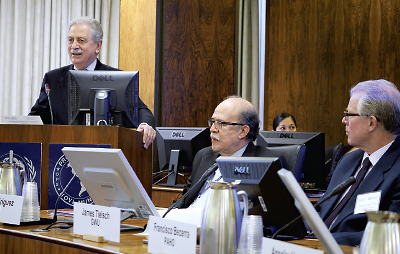“The [mental health] treatment gap is the great challenge we face today,” said Jorge Rodriguez, M.D., Ph.D., unit chief for the Mental Health and Substance Use Division at the Pan American Health Organization (PAHO). “Meeting that challenge will require cooperation by governments, health professionals, families, and consumers.”
Rodriguez spoke at a World Mental Health Day symposium at PAHO headquarters in Washington, D.C., in October.
Mental health can’t be kept as a separate category from other aspects of health, said Eliot Sorel, M.D., a clinical professor of global health, health services management and leadership, and psychiatry and behavioral sciences at George Washington University, who helped organize the program. Sorel noted that 14 percent of the global burden of disease and 30 percent to 45 percent of the global burden of disability are attributable to mental illness.
“Health is a complete state of physical, mental, and social well-being, but this is not reflected in practice,” he said.
Mental health is too often considered an afterthought to other health matters, if it is considered at all, Sorel said. There was no reference to mental health in the United Nation’s Millennium Development Goals project, nor in the initial discussion at the 2011 U.N. on noncommunicable diseases, he noted (Psychiatric News, October 7, 2011).
Thus, tearing down barriers to access to mental health services should come as part of universal health coverage and include the integration of mental health into general health services, rather than being relegated to some parallel track, said Rodriguez, recounting provisions of PAHO’s strategic plan for 2014-2019.
“Some countries have implemented innovative community-based models,” he said. “[However,] many others still have a highly centralized system where the response is concentrated in psychiatric hospitals.”
Specifically, in 20 of the 27 countries in North and South America with psychiatric hospitals, more than 50 percent of the mental health budget still goes to those institutions rather than to community-based systems, he said.
Population health must also be considered as important as individual health, said Sorel. “We need a new vision of research, policy, clinical services, and education that integrates brain, mind, and body across all public-health activities,” he concluded. “Primary care physicians, pediatricians, and public-health people must be our allies. It is a shared responsibility.”
In October, the PAHO adopted a plan of action to promote measures intended to improve mental health care in its member countries, which included the following:
•
Draft and implement plans and laws on mental health and mental health promotion, with active civil-society participation.
•
Promote universal and equitable access to comprehensive, community-based mental health services for the entire population.
•
Advance efforts to move from a model based on psychiatric hospitals toward a community-based model that integrates mental health into primary health care and into general hospitals.
•
Strengthen human resources for mental health to boost the response capacity of mental health services.
•
Engage in specific suicide-prevention interventions, including the improvement of information and surveillance systems.
•
Strengthen partnerships between different sectors of government (for example, education, labor, economy, and transportation) and between nongovernmental organizations and academia.
•
Upgrade the status of information and research on mental health issues. ■
“Ministers of Health of the Americas Pledge Action to Improve Mental Health Care” can be accessed
here. “Día Mundial de la Salud Mental: Expertos Analizaron los Nuevos Desafíos Que Enfrenta la Salud Mental en las Amȳricas” is available
here.

